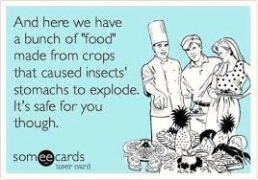GMO=OMG!!!
What exactly does “GMO” mean and why is there so much controversy about it? GMO stands for genetically modified organism. This organism is something new, not found in nature, created by scientists. Genetic data, also known as DNA, from an animal, plant, bacterium, or virus is inserted into a new plant, producing a plant with a completely new genetic code. Sound like a creepy sci-fi experiment to you? It is! And guess who the lab rats are? That would be us. Unfortunately, unbeknownst to many, the experiment has been going on for quite some time already. Hence, the controversy- should those foods be allowed at all and if so, should they be required to be labeled?
This “Franken-food” is very concerning. Inserting genes into the DNA of a food plant is random, so scientists have no idea where the genes go. This can disrupt the functioning of other genes and create new proteins never seen before in the food supply. Foreign proteins in the body can wreak havoc in the body producing allergies, digestive system diseases, autoimmune disorders, behavioral issues, birth defects…I could keep going, but you get the picture. I don’t think that it is a mere coincidence that our rates of chronic disease in this country have more than doubled since GMO foods were introduced.
Scientists have created tomatoes with a longer shelf life by adding flounder genes, soybeans that are resistant to weed killers, and potatoes that produce their own pesticides. Produce their own pesticides? What??? Yep. The DNA manufactures a pesticide toxin. You can’t wash this pesticide off because it is produced by every cell in the plant. This science fiction movie is quickly turning into a horror film! 85% of all corn in this country is genetically modified to be resistant to weed killers. That allows growers to spray as much as they want without killing their crops along with the weeds. Other foods that are highly modified are soy (called Round-Up Ready Soy), yellow and zucchini squash, canola, sugar beets (responsible for 95% of sugar production in the U.S.), and milk.
The U.S. does not have mandatory GMO labeling, and the FDA does not require safety assessments of GMO foods or even review all GMO products hitting the market. So, how do you avoid GMO foods? That is a tough question. You could move to one of the 50 countries worldwide that has completely banned GMO foods, or at least required that they be labeled, but that’s probably not a reasonable solution for most of us. Start with buying organic foods. Organic foods cannot be genetically modified and have no pesticides. Here is a great website to help you avoid GMO’s: http://www.nongmoshoppingguide.com The fight for GMO labeling in this country is underway, but the opposing side is powerful with very deep pockets. Learn more about GMO labeling here: http://www.righttoknow-gmo.org

